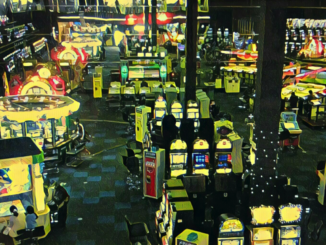
Kitchen,
Atlanta Scott – Licence CC BY-SA 2.0
I’m in the lobby of an Islington apartment block. Natasha has directed me and my ward, a wet and dripping pushchair containing a toddler called Jakey, to the lift. Too small for the three of us, Natasha tells me to press for the third floor.
“Pray the damned, unreliable thing that must have been designed by a man, doesn’t jam between the floors.”
The door consisted of mesh enclosed in frosted glass. As I pulled the handle closed, Natasha’s blurred outline sprang up the adjacent stairwell taking the steps two at a time.
“Years ago, Jakey, this was one giant house for one rich family. We’re in the servant’s lift, I’ll bet, having come through the tradesman’s entrance. Breakfast to his Lordship’s room. Jakey and Worth to somebody’s over-priced pokey flat. The world keeps on changing. The Lord cashed in. Made more from renting out rooms than from living here with the butlers and the maids. Like clearing the Highland’s of crofters and replacing them with sheep or game.”
“Maybe not. His Lordship died in the war, his estate killed by death duties. Chopped his properties into little flats to let to West Indians on social security. Followed by gentrification, duplicitous barrister types rediscovering the inner city, which is what brings you and me here.”
The door was pulled open. We’d arrived before Natasha but a telling of the potted history of Islington distracted us. In the first light-hearted moment of the day, she smirked and claimed ground to third-floor bragging rights, while standing breathless on a faded carpet surrounded by shiny front doors.
At the other side of one of which, the three of us stepped straight into a kitchen. No need to move a chair for a pushchair, Jakey had his own place set already. I juggled him out of his harness and put him into his highchair. Reunited with Natasha, the brave little chap no longer threatened to cry.
“I was schooling Jakey about his Lordship owing this house, and lands in Scotland, and being killed in the war, and making squats for immigrants before the neighbourhood attracted your QC types.”
With her back to me, Natasha stood at the worktop preparing a bottle of baby food to be warmed in a saucepan.
“Which reminds me, Mr Brainiac,” she quipped, “keep an eye on Jakey’s dins for a minute.”
She popped down the flat’s hallway and disappeared into an adjoining room.
I spoke to Jakey, leaning towards him, lowering my voice, “I’m going to put your jar in the microwave, blast it and put it back in the pan. When Natasha checks it with the tip of her tongue she’ll burn herself.”
He understood. He giggled. Both of us giggled. I was too slow to the hob. Natasha was back. She placed a book on the opposite side of the kitchen table, opened it with a clatter and leafed through. Reading glasses rested across the bridge of her nose above which her brow wore a frown.
If X branch were carrying out surveillance through the window behind Jakey, they would think us no more than a happy young couple with a child. Settled domesticity made more convincing by the row that was brewing between us. That pang returned.
Natasha found the page she was looking for. Wrong way round, I couldn’t see anything of the text other than well-presented blocks of printed blur. The only writing sizable enough to read sat at the top of the page. ‘Encyclopedia Britannica’, inverted but legible.
“Wrong,” announced Natasha with triumphalist alacrity. “The Pitcairn Islands are named after Midshipman Pitcairn, of HMS Swallow, who was the first to spot them.”
Off she flicked again, finding another useful page.
“Wrong. The friezes in Battishill Gardens aren’t leftovers from Trafalgar Square. They’re from Threadneedle Street. The sculptor did hail from Sleescale, near enough anyway. I’ll give you that. One out of three, Worth. Congratulations.”
Suffering Stockholm syndrome after her undercover work with the university and law school educated top end of London’s sleazy lowlife, myself and Natasha had been contradicting each other all morning.
Pointing to the cooker, Jakey said, “Food.”
“He can speak,” I said, surprised.
“Of course he can speak, he’s two,” replied Natasha already beside the cooker, tipping baby jar contents into a bowl then stirring and blowing on them. The abandoned encyclopedia remained opposite me, mocking me with its certainty and fixed facts.
“The problem is, Worth, your commitment to Queen, country, Empire and God, isn’t a coherent narrative. You embellish as you go along from half-remembered facts.”
“Doesn’t mean it isn’t true enough,” I countered.
She armed Jakey with an adult-sized spoon, trusted him without a bib and plonked his dinner in front of him. He sat between us but to one side, like a tennis umpire. Appropriately his head went back and forward, looking at each of us in turn as we grown-ups persisted with our childish contradiction.
“Nobody cares about what’s true. They’re convinced by what can be sustained under scrutiny,” Natasha asserted, punching way above her weight.
In our department, I hate to say, we were but glorified clerks sometimes called to derring-do during ‘all hands to the plough’ emergencies such as miner’s strikes or a worsening in Ulster’s low-intensity civil war. Deluded Natasha now thought she was a top lawyer like a lapdog thinks it’s a human child.
Jakey nodded. As well as being able to speak and umpire, he could read our minds, or at least recognise the puzzled expressions on our faces and the frustration in our voices.
“Worth, everything you say and do is exaggerated to make you and old England more important than you and it is. Stop doing it.”
I quoted from a ministerial briefing. One prepared by myself.
“Since the middle of the seventeenth century, successive British governments have determined to further national self-interest by being be involved in the world at the strategic level.”
“Be quiet,” Natasha snapped while storming out of the kitchen and down the hall again.
Jakey and myself shrugged at each other.
“Might not be the seventeenth, Jakey, don’t quote me,” I confided. “And, between ourselves old bean, staying at the strategic level means you’re tempted to over-egg the mixture every now and again. Mum’s the word.”
I tapped my nose.
“Human nature etcetera.”
He nodded while shovelling bight green goo into his mouth. Natasha returned with another document. Accompanied by a thump, The Encyclopedia Britannica was relegated to the floor. Sitting at my side this time, she placed the new papers in front of me; crisp, chalk white, well presented, professional, printed and bound by a commercial publisher. My mind flicked through the gears and I upped my game.
“How many of these are prepared?” I asked.
“One,” she tapped it with her finger. Had she varnished her nails in a hurry when out of the room, and put on some scent? Top-notch presentation plus feminine charm means only one thing. Enemy action, base under attack.
“Sure?”
“Yes.”
“Hope you’re telling the truth.”
The cover showed smiling people of different skin tones. Inside, Natasha talked me through the key points, this being her version of my operation Swaling, a report she intended to submit in contradiction of mine, like a spilt decision between judges in a fixed boxing match.
“Why all the rainbows in among the writing?” I asked.
“Why do you think?”
“To remind everybody of God’s promise to Noah not to destroy the world in another flood? Not sure how it fits in with your text? This bit seems to be about… Well, I don’t like to say the word.”
“You’ll learn,” Natasha sighed.
Well beyond her brief, her Stockholm syndrome had extended as far as aping everything her captors said in her company and writing it down in what was supposed to be my report. Far more than I’d intended, she’d not only branched our investigation in numerous unnecessary directions, she’d completely re-written the Protocol we were supposed to be following to save the country from want, trades unions, inefficiency, Irish nationalists, Johnny foreigner, poor housing, sugar shortages, power cuts, et all.
I realised she had escaped from the frying pan of the phoney Order of St Clifford’s dangerous hostels for vulnerable runaways, only to land in the hellfire of Islington progressive legal types with their crackpot obsession with rights and the structure of society.
I would have to save her. I closed her Swaling and pushed it towards her. In doing so my hand touched hers and lingered. We looked at each other. She smiled coyly. Our knees were touching. We breathed in time too. As a candid moment between kindred souls, this was unconvincing. I knew all she wanted was my permission for her report to trump mine, but all the same, my pang was becoming irresistible. I turned it into words, heard myself say them aloud and waited for her reply.
The Goodnight Vienna Audio file



